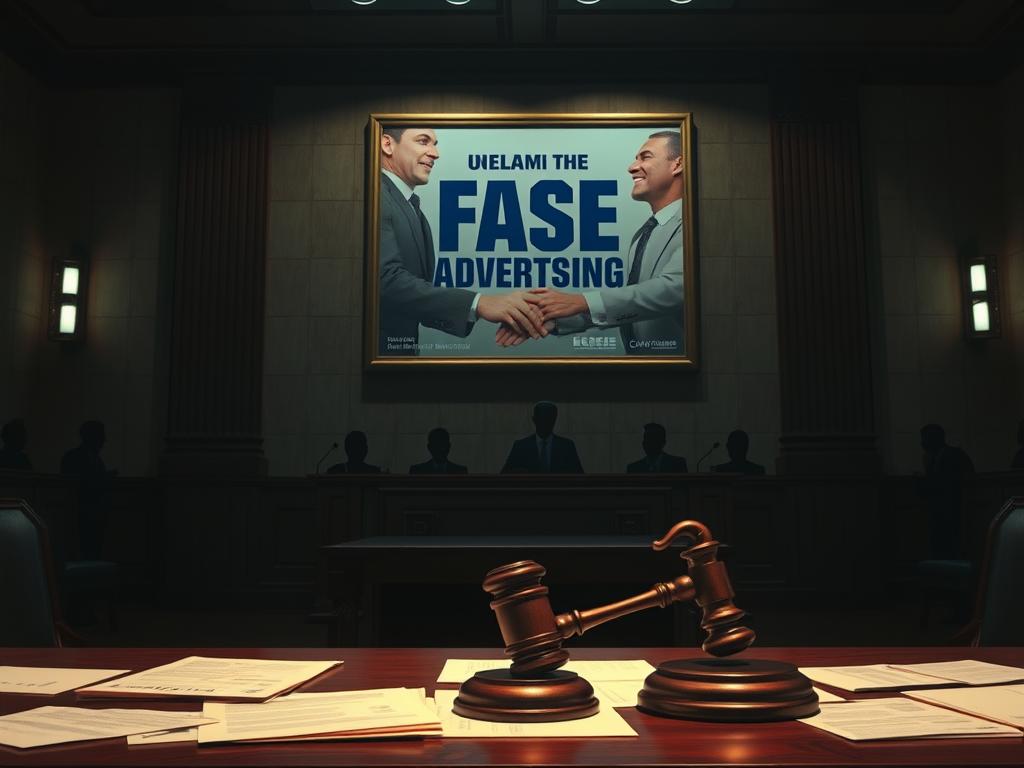In today’s marketplace, consumer protection is paramount, and false advertising claims can lead to significant compensation. U.S. consumers have the opportunity to legally challenge companies engaging in fraudulent advertising practices. Various state and federal laws prohibit deceptive ads and misleading labels, ensuring you can seek monetary damages.
When advertisers mislead consumers, it can influence purchasing decisions, prompting the need for compensation. For instance, the Federal Trade Commission (FTC) can impose civil penalties of up to $40,000 for false advertising, while the state of California allows penalties up to $2,500 per deceptive ad. New York consumers have the right to collect statutory penalties up to $50 per false advertisement. These laws serve to protect you from fraudulent advertising, providing avenues to recover money spent on falsely advertised products or services.
Understanding False Advertising Laws in the United States
In the United States, false advertising laws are designed to protect consumers from deceptive trade practices. Both federal and state regulations provide a robust framework to combat misleading advertising. Notably, the FTC Act outlaws “unfair or deceptive acts” in commerce, placing strict guidelines on how companies can market their products.

Federal False Advertising Laws
At the federal level, the Federal Trade Commission (FTC) plays a significant role in regulating advertising practices. The FTC Act is the cornerstone of federal legislative measures against false advertising. This act empowers the FTC to investigate complaints and take action against companies engaged in deceptive trade practices. Additionally, the Food and Drug Administration (FDA) enforces FDA regulations related to the labeling and advertising of pharmaceuticals and food items, ensuring that consumers receive accurate information.
State False Advertising Laws
State laws also offer protection against false advertising, supplementing federal regulations. For instance, the Uniform Deceptive Trade Practices Act (UDTPA), adopted by many states, prohibits various forms of misleading advertising, thus providing a standard approach across state lines. In California, the Unfair Competition Law and Consumers Legal Remedies Act are tailored to safeguard consumers from deceptive trade practices. Violations of these state-specific laws can be reported to state attorneys general or dedicated consumer protection agencies.
Types of False Advertising
False advertising can manifest in multiple forms, each carrying its own legal implications. Some common types include:
- Misleading Claims: For instance, Dannon was ordered to pay about $45 million in 2010 for false advertising claims related to Activia and DanActive yogurts.
- Hidden Fees: The FTC often tackles complaints regarding hidden fees and surcharges in industries like telecommunications and airlines.
- Puffery: In 1997, Pizza Hut sued Papa John’s over a false advertising slogan, sparking a major legal dispute.
- Deceptive Pricing: Cases such as inflating prices during “going out of business” sales fall under this category.
Understanding these types can help consumers identify deceptive trade practices and seek appropriate legal remedies. Experienced attorneys can guide you through the legal process, ensuring that you can effectively report violations and claim damages under the FTC Act, FDA regulations, or state-level acts like the Uniform Deceptive Trade Practices Act.
Legal Actions and Penalties for False Advertising
False advertising can have significant legal consequences for businesses. Companies that violate trade practices can face substantial financial penalties and other legal actions. These measures aim to provide consumer redress, ensure financial restitution, and maintain fair trade practices litigation.
Monetary Damages
Monetary damages aim to compensate consumers for any losses incurred due to false advertising. These damages cover the cost of the falsely advertised products or services. For example, if a product was advertised with misleading claims that resulted in consumer loss, the company would be required to pay financial restitution to the affected customers.
Punitive Damages
In cases of particularly malicious or deceptive advertising practices, courts may award punitive damages. These damages are intended not only to compensate the victims but also to punish the offending company, serving as a deterrent against future misconduct. This aspect of trade practices litigation helps ensure that businesses adhere to ethical advertising standards.
Civil Penalties
Civil penalties for false advertising can be quite substantial. For instance, the Federal Trade Commission (FTC) can impose penalties as high as $50,120 per violation on companies engaging in unlawful practices. Recently, the FTC sent a Notice of Penalty Offenses to roughly 670 companies involved in marketing over-the-counter drugs, homeopathic products, dietary supplements, and functional foods. The Notice primarily targets violations such as making health claims without reliable scientific evidence and misrepresenting scientific proof. Notably, the FTC’s authority extends to areas like endorsements and money-making opportunities, stressing the importance of accurate advertising.

Additionally, the case of Lexmark Intl., Inc. v. Static Control Components Inc. in 2014 set a precedent for competitors to sue one another for false advertising under the Lanham Act. Before this ruling, various federal circuits used different tests to establish standing for such claims. The Lexmark decision introduced a two-prong standing test requiring plaintiffs to demonstrate that their interests fall within the “zone of interests” protected by the statute and that their injuries are directly caused by the violations. This empowers competitors to help regulate the market by identifying misleading claims through their knowledge of the industry.
In summary, companies engaged in deceptive practices may face legal actions and penalties designed to enforce consumer redress and ensure the credibility of trade practices litigation. Civil penalties, alongside monetary and punitive damages, serve as crucial mechanisms to maintain fairness and ethical standards in advertising.
How Much Can You Get For Suing For False Advertising
When you sue for false advertising, the financial recovery can be substantial, depending on various factors. Key considerations include the extent of deception, consumer reliance on the false information, and the harm incurred. Actual damages might be calculated based on the amount paid for the product or service, while statutory damages provide a pre-defined amount per violation.
The Colorado law, for instance, permits consumers to sue for false advertising and potentially receive three times the damages incurred. Federal Trade Commission enforces “truth in advertising” laws under the Federal Trade Commission Act and can issue court orders penalizing deceptive advertisements. Noteworthy cases include Dannon, which had to pay about $45 million in damages in 2010 over false health claims about their yogurt products. This kind of legal restitution showcases the high stakes involved in false advertising lawsuits.
Furthermore, class action lawsuits can significantly amplify the total recoverable damages by combining smaller claims from a group of affected consumers. This collective approach increases the pressure on the offending company to settle. For example, Western Digital settled a class action lawsuit due to misleading hard drive capacity claims by compensating affected consumers. Such legal actions underscore the importance of seeking counsel from a consumer protection attorney to effectively navigate the legal process and build a solid case for lawsuit compensation.
State laws also play a crucial role. The California Consumers Legal Remedies Act prevents deceptive business practices and mandates that offending companies cover legal fees and pay money damages for consumer harm. Each violation, defined as a distinct false or misleading statement, can lead to substantial fines and financial recovery for the aggrieved parties.
For more detailed information on legal recourse, you can visit this resource which further elaborates on the mechanisms to hold dishonest businesses accountable and the potential for financial compensation.
Factors Influencing Payout in False Advertising Cases
The payout in false advertising cases can vary significantly based on several crucial legal case factors. Understanding the dynamics involved can help you navigate potential compensation and penalties.
Severity of Misleading Information
The degree of falsehood in advertising misrepresentation impacts the overall payout. Severe misleading information, such as blatant lies or significant omissions of crucial facts, tends to attract higher penalties. For instance, civil penalties can range from thousands to millions of dollars, depending on the violation’s gravity. The Federal Trade Commission (FTC) might also impose fines of $51,744 per day per ad for future violations.
Extent of Consumer Harm
The extent and scale of consumer harm are pivotal in determining compensation. This includes the number of consumers affected and the total financial loss they suffer. In cases where false advertising has led to widespread consumer detriment, companies might be required to offer full or partial refunds. Furthermore, corrective advertising may be mandated to counteract misinformation, alongside additional disclosures in future ads.
Laws Governing Jurisdiction
The jurisdiction’s regulations, whether federal or state, heavily influence case outcomes. Federal guidelines, enforced by regulatory bodies like the FTC, provide overarching rules, while state laws may impose additional requirements or penalties. The FTC cannot pre-approve ads but provides guidance ensuring compliance with advertising laws, which is crucial for determining fines and corrective measures.
Presence of Class Action Lawsuits
Class action claims can significantly elevate the potential payout. When a large pool of plaintiffs is involved, penalties for each instance of false advertising collectively mount. This aggregation can lead to substantial settlements or judgments, enhancing the compensation prospects for affected consumers. Such lawsuits are crucial for addressing systemic advertising misrepresentation impacts across various industries, from financial services to internet service providers.
| Factor | Impact on Payout |
|---|---|
| Severity of Misleading Information | High fines and mandatory corrective actions |
| Extent of Consumer Harm | Refunds, corrective advertising, higher penalties |
| Laws Governing Jurisdiction | Influences fines and regulatory actions |
| Class Action Lawsuits | Increased aggregate payouts |
The FTC regularly updates its website with newer enforcement actions, providing detailed information that can help companies stay compliant and understand these legal case factors better. As businesses navigate the constantly evolving landscape of advertising laws, being well-informed about the impacts of misrepresentations and potential class action claims becomes indispensable.
How Much Can You Get For Suing an App for False Advertising?
The amount you can receive for suing an app for false advertising depends on factors like damages suffered, evidence presented, and legal rulings. When users sue apps false advertising, settlements can range from small refunds to substantial payouts if harm is proven, incentivizing companies to uphold transparency in their practices.
Conclusion
Suing for false advertising provides a tangible pathway for consumers seeking justice and financial redress from misleading and fraudulent marketing practices. Supported by robust federal and state laws, including the Lanham Act, individuals and businesses alike have the legal recourse to challenge deceptive activities. Through effective consumer advocacy and specialized legal guidance, it is possible to confront companies engaging in deceptive marketing accountability and to secure significant compensation.
The extent of monetary recovery in false advertising cases hinges on several factors. Courts assess elements such as the severity of the misleading information, the extent of consumer harm, and whether class action lawsuits are involved. Legal provisions allow for various forms of relief, including monetary damages, injunctions to halt the deceptive practices, corrective actions, and compensation for attorneys’ fees. Specific instances of deception, such as misrepresentations, omissions, and false guarantees, can all lead to substantial judicial consequences for businesses.
The impact of false advertising is far-reaching and includes potential lawsuits, corrective measures, and substantial financial penalties. The Federal Trade Commission (FTC) has sent notices to numerous companies, warning them of significant fines for future offenses related to misleading claims. These notices aim to curb deceptive practices across different sectors, including educational institutions, advertising firms, and other businesses using endorsements and testimonials. By understanding these legal frameworks and leveraging consumer advocacy, you can effectively confront and rectify the harms caused by deceptive marketing practices.








